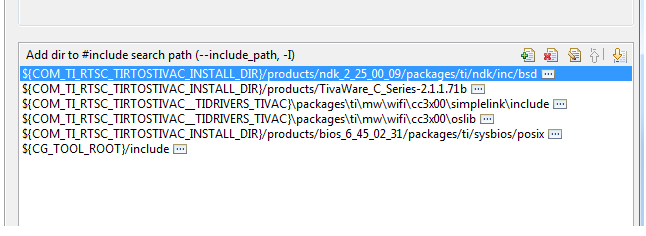Part Number: CC3100
Other Parts Discussed in Thread: , , TM4C1294NCPDT
Tool/software: TI-RTOS
Hi,
I am experimenting with SimpleLink for the first time. I use CC3100BOOST board together with TM4c1294 MCU. In particular I am trying to run tcpEchoCC3X00 project from TI_RTOS/TIVA examples. My confusion came from the fact that I had to make the following links to CC3100-SDK:
Some of the links point to msp430 platform. I have resolved all errors and tcpEchoCC3X00 example worked. Is there a simpler way to correctly include all necessary files? Did I miss something?
Secondly, I would like to ask if it is necessary for this CC3100 board to run the ServicePack update (using dedicated emulation board) ?
Thanks.




